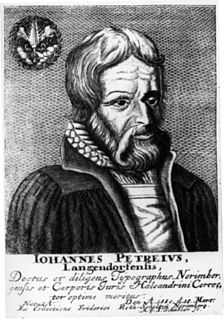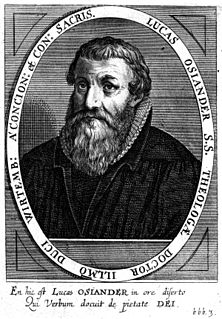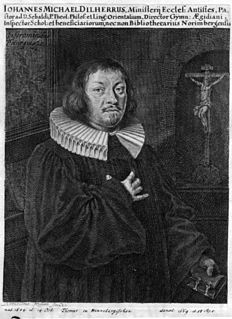Life
From 1689 to 1694 he studied philosophy and theology at the University of Jena. In 1695 he assumed the position of inspector of the alumni in Altdorf. In 1698 he moved to Nuremberg and worked as a vicar and as a professor of metaphysics at the Aegidianum. Two years later he was appointed deacon at St. Sebaldus Church, Nuremberg.
During his time in Nuremberg, Zeltner get his doctorate in theology and returned to Altdorf in 1706 to teach theology and oriental studies at the local university. In 1730 he was accepted as an external member of the Prussian Academy of Sciences.
Zeltner spent his retirement in Poppenreuth, where he held the position of pastor from 1730 until his death.
The German National Academy of Sciences Leopoldina, short Leopoldina, is the national academy of Germany, and is located in Halle (Saale). Founded on January 1, 1652, based on academic models in Italy, it was originally named the Academia Naturae Curiosorum until 1687 when Emperor Leopold I raised it to an academy and named it after himself. It was since known under the German name Deutsche Akademie der Naturforscher Leopoldina until 2007, when it was declared to be Germany's National Academy of Sciences. The Leopoldina has a claim to be the oldest continuously existing learned society in the world. The validity of the claim depends in part on how certain definitional and historical questions are answered.

Johann Christian Gottlieb Ackermann was a German doctor.

Johann Tobias Mayer was a German physicist. He was mainly well known for his mathematics and natural science textbooks. Anfangsgründe der Naturlehre zum Behuf der Vorlesungen über die Experimental-Physik, an 1801 physics text, was the most influential of its time in the German-speaking countries. Mayer's research in experimental physics and astronomy appeared in Annalen der Physik. He is not to be confused with his famous father, the astronomer Tobias Mayer.

Georg Philipp Harsdörffer was a Baroque-period German poet and translator.

The University of Altdorf was a university in Altdorf bei Nürnberg, a small town outside the Free Imperial City of Nuremberg. It was founded in 1578 and received university privileges in 1622 and was closed in 1809 by Maximilian I Joseph of Bavaria.

Johann(es) Petreius was a German printer in Nuremberg.

Hans Lufft (1495–1584) was a German printer and publisher, commonly called "the Bible Printer," because in 1534 he printed at Wittenberg the first complete edition of Luther's Bible, in two Folio volumes with woodcut illustrations by Lucas Cranach. Lufft printed in the 40 years following more than 100,000 copies of the German Bible. He also printed many of Luther’s other works.
A Christian Hebraist is a scholar of Hebrew who comes from a Christian family background/belief, or is a Jewish adherent of Christianity. The main area of study is that commonly known as the Old Testament to Christians, but Christians have occasionally taken an interest in the Talmud, and Kabbalah.

Johannes Praetorius or Johann Richter was a Bohemian German mathematician and astronomer.
Johannes Christoph Andreas Zahn was a German theologian and musicologist best known for his opus Die Melodien der deutschen evangelischen Kirchenlieder, a critical anthology of almost 9,000 hymn melodies developed and used in German Lutheran churches.

Caspar Othmayr was a German Lutheran pastor and composer.

Lucas Osiander the Elder was a German pastor of the Evangelical-Lutheran Church in Württemberg and a composer of Lutheran church music. He was a son of the reformer Andreas Osiander and father to Lucas Osiander the Younger.
Georg Lorenz Bauer was a German Lutheran Theologian, and writer on his subject.
Gustav Wilhelm Frank was a German-Austrian Protestant theologian, known as the author of a multi-volume work on the history of Protestant theology.
Maximilian Nagel was a German theologian.
Georgius Hornius was a German historian and geographer, professor of history at Leiden University from 1653 until his death.

Johann Michael Dilherr was a German Protestant theologian and philologist at the universities of Jena and Atldorf (Nuremberg).

Gustav Philipp Mörl or Gustav Philipp Morl; Gustavus Philippus Moerl was a German theologian, was born at Nuremberg December 26, 1673, and was educated first in the schools of his native place and then at the university in Altdorf, where he studied philosophy and philology from 1690 to 1692, when he was removed to Jena to study theology and the ancient languages. He traveled through Holland, and visited its most important universities. After his return home he was appointed assistant of the philosophic faculty at Halle, and in 1698 became professor and ecclesiastical inspector at Altdorf. He resigned this position in 1703, and was appointed dean of St. Sebald's church at Nuremberg. In 1706 he was appointed minister of the St. Aegidien church, and inspector of the gymnasium; in 1714 minister at St. Lawrence, in connection with which he had the supervision of the ecclesiastical seminary. In 1724 he was appointed minister of the church of St. Sebald, superintendent of the consistory of Nuremberg, city librarian, and professor of divinity of the Aegidische gymnasium. He died May 7, 1750.
Johann Sigismund Mörl was a German theologian. Son of Gustav Philipp Mörl, he was born at Nuremberg March 3, 1710, and was educated in his native place until ready for the university at Altdorf, where he studied theology after 1727. In 1735 he was appointed dean of a church at Nuremberg. He preached until 1759, when he was appointed minister and inspector of the "Egidianum." In 1765 he was elected in this gymnasium to the professorship of Greek. Towards the close of 1770 he was called to the position of minister of St. Lawrence's church. In 1773 he accepted the position of first minister at St. Sebald's church, the superintendency of the consistory of Nuremberg, the office of city librarian, and also a professorship of positive divinity and moral philosophy. He died February 22, 1791.

Johann Jacob Baier was a German physician and naturalist who wrote on the geology and fossils of the Nuremberg area in his book Oryctographia Norica. He considered the Deluge of the Bible to be the only catastrophe to have occurred in earth history.
This page is based on this
Wikipedia article Text is available under the
CC BY-SA 4.0 license; additional terms may apply.
Images, videos and audio are available under their respective licenses.













